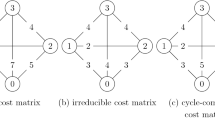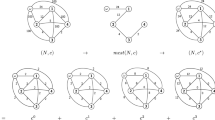Abstract
We study minimum cost spanning tree problems with groups, where agents are located in different villages, cities, etc. The groups are formed by agents living in the same village. In Bergantiños and Gómez-Rúa (Economic Theory 43:227–262, 2010) we define the rule F as the Owen value of the irreducible game with groups and we prove that F generalizes the folk rule of minimum cost spanning tree problems. Bergantiños and Vidal-Puga (Journal of Economic Theory 137:326–352, 2007a) give two characterizations of the folk rule. In the first one they characterize it as the unique rule satisfying cost monotonicity, population monotonicity and equal share of extra costs. In the second characterization of the folk rule they replace cost monotonicity by independence of irrelevant trees and population monotonicity by separability. In this paper we extend such characterizations to our setting. Some of the properties are the same (cost monotonicity and independence of irrelevant trees) and the other need to be adapted. In general, we do it by claiming the property twice: once among the groups and the other among the agents inside the same group.



Similar content being viewed by others
References
Aarts, H., & Driessen, T. (1993). The irreducible core of a minimum cost spanning tree game. Mathematical Methods of Operations Research, 38, 163–174.
Albizuri, M. J. (2009). Generalized coalitional semivalues. European Journal of Operational Research, 196(2), 578–584.
Bergantiños, G., & Gómez-Rúa, M. (2010). Minimum cost spanning tree problems with groups. Economic Theory, 43, 227–262.
Bergantiños, G., & Lorenzo, L. (2004). A non-cooperative approach to the cost spanning tree problem. Mathematical Methods of Operations Research, 59, 393–403.
Bergantiños, G., & Lorenzo, L. (2005). Optimal equilibria in the non-cooperative game associated with cost spanning tree problems. Annals of Operations Research, 137, 101–115.
Bergantiños, G., & Lorenzo, L. (2008). Non cooperative cost spanning tree problems with budget restrictions. Naval Research Logistics, 55, 747–757.
Bergantiños, G., Lorenzo, L., & Lorenzo-Freire, S. (2010). The family of cost monotonic and cost additive rules in minimum cost spanning tree problems. Social Choice and Welfare, 34, 695–710.
Bergantiños, G., Lorenzo, L., & Lorenzo-Freire, S. (2011). A generalization of obligation rules for minimum cost spanning tree problems. European Journal of Operational Research, 211, 122–129.
Bergantiños, G., & Lorenzo-Freire, S. (2008). Optimistic weighted Shapley rules in minimum cost spanning tree problems. European Journal of Operational Research, 185, 289–298.
Bergantiños, G., & Vidal-Puga, J. J. (2007a). A fair rule in minimum cost spanning tree problems. Journal of Economic Theory, 137, 326–352.
Bergantiños, G., & Vidal-Puga, J. J. (2007b). The optimistic TU game in minimum cost spanning tree problems. International Journal of Game Theory, 36, 223–239.
Bergantiños, G., & Vidal-Puga, J. J. (2009). Additivity in minimum cost spanning tree problems. Journal of Mathematical Economics, 45, 38–42.
Bird, C. G. (1976). On cost allocation for a spanning tree: a game theoretic approach. Networks, 6, 335–350.
Bogomolnaia, A., & Moulin, H. (2010). Sharing the cost of a minimal cost spanning tree: beyond the folk solution. Games and Economic Behavior, 69, 238–248.
Branzei, R., Moretti, S., Norde, H., & Tijs, S. (2004). The P-value for cost sharing in minimum cost spanning tree situations. Theory and Decision, 56, 47–61.
Chun, Y., & Lee, J. (2009). Sequential contributions rules for minimum cost spanning tree problems. Mimeo, Seoul University.
Dutta, B., & Kar, A. (2004). Cost monotonicity, consistency and minimum cost spanning tree games. Games and Economic Behavior, 48, 223–248.
Feltkamp, V., Tijs, S., & Muto, S. (1994). On the irreducible core and the equal remaining obligation rule of minimum cost extension problems. Mimeo, Tilburg University.
Gómez-Rúa, M., & Vidal-Puga, J. (2010). The axiomatic approach to three values in games with coalition structure. European Journal of Operational Research, 207, 795–806.
Hart, S., & Kurz, M. (1983). Endogenous formation of coalitions. Econometrica, 51(4), 1047–1064.
Kar, A. (2002). Axiomatization of the Shapley value on minimum cost spanning tree games. Games and Economic Behavior, 38, 265–277.
Kruskal, J. (1956). On the shortest spanning subtree of a graph and the traveling salesman problem. Proceedings of the American Mathematical Society, 7, 48–50.
Owen, G. (1977). Values of games with a priori unions. In R. Henn & O. Moeschlin (Eds.) Essays in mathematical economics and game theory (pp. 76–88). New York: Springer.
Prim, R. C. (1957). Shortest connection networks and some generalizations. Bell Systems Technology Journal, 36, 1389–1401.
Pulido, M., & Sánchez-Soriano, J. (2009). On the core, the Weber set and convexity in games with a priori unions. European Journal of Operational Research, 193, 468–475.
Shapley, L. S. (1953). A value for n-person games. In H. W. Kuhn & A. W. Tucker (Eds.), Contributions to the theory of games II (pp. 307–317). Princeton: Princeton University Press
Acknowledgements
Financial support from Ministerio de Ciencia y Tecnología and FEDER through grants ECO2008-03484-C02-01/ECON and ECO2011-23460 and from Xunta de Galicia through grants PGIDIT06PXIB362390PR, INCITE08PXIB300005PR and 10 PXIB 362 299 PR is gratefully acknowledged.
Author information
Authors and Affiliations
Corresponding author
Appendix
Appendix
We prove Proposition 1, which is a consequence of the following claims.
Claim 5
There exist rules satisfying cost monotonicity (and hence independence of irrelevant trees), population monotonicity over groups (and hence separability among groups), population monotonicity over agents (and hence separability among agents), and failing coalitional share of extra costs: Let define the rule f 1 as follows. Given \(T\subset\mathcal{N}\), let π N denote the order induced in N by the index of the agents. Namely, given i,j∈N, π N(i)<π N(j) if and only if i<j. For each mcstp (N 0,C) and i∈N we define
Let (N 0,C,G) be an mcstp with groups and i∈G k. Thus,
Claim 6
There exist rules satisfying cost monotonicity (and hence independence of irrelevant trees), population monotonicity over groups (and hence separability among groups), coalitional share of extra costs and failing separability among agents (and hence population monotonicity over agents): Let define the rule f 2 as follows. For each mcstp (N 0,C) and i∈N we define the equal division rule as
Let (N 0,C,G) be a mcstp with groups and i∈G k. Thus,
Claim 7
There exist rules satisfying cost monotonicity (and hence independence of irrelevant trees), population monotonicity over agents (and hence separability among agents), coalitional share of extra costs and failing separability among groups (and hence population monotonicity over groups). We define the rule f 3 as follows. Let (N 0,C,G) be a mcstp with groups and i∈G k. Thus,
where

Claim 8
There exist rules satisfying population monotonicity over groups (and hence separability among groups), population monotonicity over agents (and hence separability among agents), coalitional share of extra costs and failing cost monotonicity (and hence independence of irrelevant trees): We define the rule f 4 as follows. Let (N 0,C,G) be a mcstp with groups. We say that π∈Π N is admissible if the following conditions are satisfied: (i) given i∈G k, j∈G k′, k≠k′, if π(i)<π(j), then \(c_{0k}^{G}\leq c_{0k^{\prime}}^{G}\); (ii) given i,j∈G k, if π(i)<π(j), then c 0i ≤c 0j and (iii) if π(i)<π(j)<π(l), with i,l∈G k, then, j∈G k. We denote by Π ′N the set of all permutations over N that are admissible. In an intuitive way: we first order the groups by decreasing connection cost to the source; and then the agents inside groups following the same idea.
Thus, for all i∈N,
Proof of Claim 5
1. f 1 satisfies cost monotonicity. Let (N 0,C,G) and (N 0,C′,G) be such that C≤C′. Consider the problems among coalitions, (G 0,C G) and (G 0,C ′G). Then, C G≤C ′G. Since φ satisfies cost monotonicity (Theorem 0), φ k (G 0,C G)≤φ k (G 0,C ′G) for all G k∈G 0.
Consider now the problem inside a coalition \(G_{0}^{k}\) with k=1,…,r. Then, C φ≤C ′φ. By definition of the irreducible matrix, (C φ)∗≤(C ′φ)∗. By Lemma 0(b), for all i∈G k,
2. f 1 satisfies population monotonicity over groups. See Bergantiños and Gómez-Rúa (2010).
3. f 1 satisfies population monotonicity over agents. See Bergantiños and Gómez-Rúa (2010).
4. f 1 fails coalitional share of extra costs. Consider the mcstp with groups where N={1,2}, G={{i}} i∈N , and matrices
In this case, f 1(N 0,C,G)=(10,2) and f 1(N 0,C′,G)=(12,2). □
Proof of Claim 6
1. f 2 satisfies cost monotonicity. Let (N 0,C,G) and (N 0,C′,G) be such that C≤C′. Then C G≤C ′G. Since φ satisfies cost monotonicity (Theorem 0), φ k (G 0,C G)≤φ k (G 0,C ′G) for all G k∈G 0.
Consider now the problem inside a coalition \((G_{0}^{k},C^{\varphi})\) with k=1,…,r. Then, C φ≤C ′φ and hence
for all i∈G k.
2. f 2 satisfies population monotonicity over groups. Let G k∈G. Since φ satisfies population monotonicity (Theorem 0), \(\varphi_{l}(G_{0},C^{G})\leq\varphi_{l}((G\backslash G^{k})_{0},C^{G\backslash G^{k}})\) for all \(l\not=k\). Furthermore, \(((G\backslash G^{k})_{0},C^{G})=((G\backslash G^{k})_{0},C^{G\backslash G^{k}})\).
Let C ′φ denote the matrix C φ associated with the problem ((N∖G k)0,C,G∖G k).
Let G l∈G∖G k. For all i,j∈G l, \(c_{ij}^{\varphi }=c_{ij}^{\prime\varphi}\). For all i∈G l,
That is C φ≤C ′φ. Then, \(E_{i}(G_{0}^{l},C^{\varphi})\leq E_{i}(G_{0}^{l},C^{\prime\varphi})\) and hence,
3. f 2 satisfies coalitional share of extra costs. The proof is similar than the one for F and we omit it.
4. f 2 fails separability among agents. Consider the mcstp with groups where N={1,2,3}, G={N}, and matrix
In this case, it is clear that m(N 0,C)=m({1,2}0,C)+m({3}0,C). However, \(f^{2}(N_{0},C,G)= ( \frac{2}{3},\frac{2}{3},\frac {2}{3} ) \) and \(f^{2}(\{1,2\}_{0},C)= ( \frac{1}{2},\frac{1}{2} ) \) and f 2({3}0,C)=1. □
Proof of Claim 7
1. f 3 satisfies cost monotonicity. Let (N 0,C,G) and (N 0,C′,G) such that C≤C′. Then C G≤C ′G. Hence, E k (G 0,C G)≤E k (G 0,C ′G) for all G k∈G 0.
Consider now the problem inside a coalition \((G_{0}^{k},C^{E})\) with k=1,…,r. Then, C E≤C ′E. Since φ satisfies cost monotonicity (Theorem 0),
for all i∈G k.
2. f 3 satisfies population monotonicity over agents. Let G k∈G and i∈G k. By convenience, let us denote as C′ the cost matrix C restricted to the problem ((N∖{i})0,C,G −i). Notice that C′ coincides with C on the agents of (N∖{i})0.
We consider several cases:
-
(a)
Assume that \(c_{kl}^{G}=c_{kl}^{\prime G}\) for all l∈{0,1,…,r}. Thus, \(E_{l} ( G_{0},C^{G} ) =E_{l} ( G^{-i},C^{\prime G^{-i}} ) \) for all l=1,…,r.
-
Let j∈G k∖{i}. Since φ satisfies population monotonicity (Theorem 0), \(\varphi_{j} ( G_{0}^{k},C^{E} ) \leq\varphi_{j} ( (G^{k}\backslash \{i\})_{0},C^{E} ) \). Then,

-
Let G l∈G such that l≠k. Then, \(c_{jj^{\prime }}^{E}=c_{jj^{\prime}}^{\prime E}\) for all j,j′∈G l∪{0}. Hence,
$$f_{j}^{3}(N_{0},C,G)=f_{j}^{3} \bigl(\bigl(N\backslash\{i\}\bigr)_{0},C^{\prime},G^{-i} \bigr). $$
-
-
(b)
Assume that \(c_{kk^{\prime}}^{G}\not=c_{kk^{\prime }}^{\prime G}\) for some k′∈{0,1,…,r}. Then, \(c_{kk^{\prime }}^{G}<c_{kk^{\prime}}^{\prime G}\). Furthermore, \(c_{ll^{\prime }}^{G}\leq c_{ll^{\prime}}^{\prime G}\) for all l,l′∈{0,1,…,r}.
Then, E k (G 0,C G)≤E k (G 0,C ′G), \(c_{jj^{\prime}}^{E}=c_{jj^{\prime}}^{\prime E}\) for all j,j′∈G k∖{i}, and \(c_{0j}^{E}\leq c_{0j}^{\prime E}\) for all j∈G k∖{i}. Since φ satisfies cost monotonicity (Theorem 0), φ j ((G k∖{i})0,C E)≤φ j ((G k∖{i})0,C ′E) for all j∈G k∖{i}.
Since φ satisfies population monotonicity (Theorem 0), \(\varphi_{j} ( G_{0}^{k},C^{E} ) \leq \varphi_{j} ( (G^{k}\backslash \{i\})_{0},C^{E} ) \). Then, for all j∈G k∖{i}

3. f 3 satisfies coalitional share of extra costs. The proof is similar than the one for F and we omit it.
4. f 3 fails separability among groups, consider the mcstp with groups where N={1,2,3}, G={{i}} i∈N , and matrix
In this case, it is clear that m(N 0,C)=m({1,2}0,C)+m({3}0,C). However, \(f^{3}(N_{0},C,G)= ( \frac{2}{3},\frac{2}{3},\frac {2}{3} ) \) and \(f^{3}(\{1,2\}_{0},C)= ( \frac{1}{2},\frac{1}{2} ) \) and f 3({3}0,C)=1. □
Proof of Claim 8
1. f 4 satisfies population monotonicity over groups. We can prove this by performing some computations. Even the proof is not trivial, we do not believe it is especially relevant and we omit it.
2. f 4 satisfies population monotonicity over agents. We can prove this by performing some computations. Even the proof is not trivial, we do not believe it is especially relevant and we omit it.
3. f 4 satisfies coalitional share of extra costs. Let (N 0,C,G) and (N 0,C′,G) be two mcstp with groups under the conditions of coalitional share of extra costs. Then, a permutation π∈Π ′N is admissible if given i,i′∈G k∈G and j∈N with π(i)<π(j)<π(i′), then j∈G k. Therefore, \(f^{4}(N_{0},C,G)=Ow(N,v_{C^{\ast}},G)\). In Bergantiños and Gómez-Rúa (2010) we prove that \(F ( N_{0},C,G ) =Ow ( N,v_{C^{\ast }},G ) \). Then, in this case, f 4(N 0,C,G)=F(N 0,C,G), and we have proved above that F satisfies coalitional share of extra costs.
4. f 4 fails cost monotonicity. Consider the mcstp with groups (N 0,C,G) and (N 0,C′,G) where N={1,2}, G={{i}} i∈N , and matrices
In this case, f 4(N 0,C,G)=(10,0) and f 4(N 0,C′,G)=(0,20). □
Rights and permissions
About this article
Cite this article
Bergantiños, G., Gómez-Rúa, M. An axiomatic approach in minimum cost spanning tree problems with groups. Ann Oper Res 225, 45–63 (2015). https://doi.org/10.1007/s10479-012-1251-x
Published:
Issue Date:
DOI: https://doi.org/10.1007/s10479-012-1251-x






